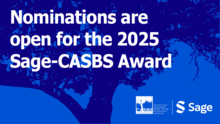
The Center for Advanced Study in the Behavioral Sciences (CASBS) at Stanford University and Sage now are accepting nominations for the 2025 Sage-CASBS Award.
View the official media release
The Award
Established in 2013, the Sage-CASBS Award recognizes outstanding achievement in the behavioral and social sciences that advances our understanding of pressing social issues. The award underscores the role of the social and behavioral sciences in enriching and enhancing public discourse and good governance.

“Social and behavioral scientists deserve recognition for the knowledge they generate, discussions they advance, policies they influence, and lives they impact,” Sage CEO Blaise Simqu and CASBS director Sarah Soule wrote in a joint statement. “Through celebrating them and their work, which often crosses disciplinary boundaries, our organizations together reaffirm deep, long-held commitments – Sage for nearly 60 years and CASBS for 70 years – to enhancing public welfare and promoting successful societies.”
In 2025 we will recognize the eighth winner of the award. The inaugural recipient was psychologist Daniel Kahneman, 2002 Nobel laureate in economic sciences and author of the acclaimed book, Thinking, Fast and Slow. The other six winners were Pedro Noguera, the sociologist, education rights activist, and dean of the Rossier School of Education at the University of Southern California; Kenneth Prewitt, former Director of the U.S. Census Bureau and the Carnegie Professor of Public Affairs, Emeritus at Columbia University; William Julius Wilson, the Lewis P. and Linda L. Geyser University Professor, Emeritus at Harvard University; Carol Dweck, the Lewis and Virginia Eaton Professor of Psychology at Stanford University; and Jennifer Richeson, the Philip R. Allen Professor of Psychology at Yale University. In 2023, we honored two winners – Elizabeth Anderson, the Arthur F. Thurnau Professor as well as the John Dewey Distinguished University Professor of Philosophy and Women's & Gender Studies at the University of Michigan; and Alondra Nelson, the Harold F. Linder Chair and Professor of Social Science at the Institute for Advanced Study.
Kahneman, incidentally, was a CASBS fellow in 1977-78; Prewitt was a fellow in 1983-84; Wilson was a fellow in 1981-82; Richeson was a fellow in 2021-22; and Dweck was a consulting scholar in 2014-15.
In addition to a cash prize, the Sage-CASBS Award winner will deliver a public lecture to be held at CASBS in spring 2025.
Eligibility
CASBS and Sage seek nominees who represent the best of contemporary social science, who demonstrate sustained passion in their efforts to transform research, and whose work has positive impact on society as a whole. Previous CASBS fellowship is not required.
Nominees must be distinguished academics and researchers in the social and behavioral sciences with a proven record of research and influence. The nominees can come from any part of the world and from any of the social and behavioral science fields, but the selection committee particularly values those whose contributions cross several disciplines. Of most importance is that the nominee’s work has transformative consequences for a significant arena of social, political, or economic life.
The Nomination Process
Access and submit the online nomination form on this web page: https://applycasbs.stanford.edu/sagecasbs. The deadline for nominations is September 16, 2024. Please note that no self-nominations will be accepted.
The selection committee, co-chaired by Blaise Simqu and Sarah Soule, will consist of at least two additional members. After an extensive review process, the committee will announce the Sage-CASBS Award winner in fall 2024.
The Institutions
Sage is a global academic publisher of books, journals, and library resources with a growing range of technologies to enable discovery, access, and engagement. Believing that research and education are critical in shaping society, 24-year-old Sara Miller McCune founded Sage in 1965. Today, we are controlled by a group of trustees charged with maintaining our independence and mission indefinitely.
Our guaranteed independence means we’re free to:
· Do more – supporting an equitable academic future, furthering disciplines that drive social change, and helping social and behavioral science make an impact
· Work together – building lasting relationships, championing diverse perspectives, and co-creating resources to transform teaching and learning
· Think long-term – experimenting, taking risks, and investing in new ideas
Founded in 1954, the Center for Advanced Study in the Behavioral Sciences (CASBS) at Stanford University is renowned as a place where deep thinkers from diverse disciplines and communities come together to confront critical issues of our time. At CASBS, boundaries and assumptions are challenged and cross-disciplinary thinking is the norm. The Center has hosted generations of distinguished scholars and scientists who, in the spirit of collaboration, form an enduring community that advances our understanding of the full range of human beliefs, behaviors, interactions, and institutions. casbs.stanford.edu
